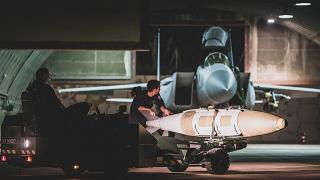Even as Iran was counter-attacking with massive missile strikes against Tel Aviv today, in response to the early morning June 13 Israeli attack against Iran’s nuclear program and scientific and military command structure, an urgent and extensive policy discussion was underway among leading U.S. and international strategic analysts at the 106th consecutive weekly meeting of the International Peace Coalition (IPC).
The IPC was initiated over two years ago by Schiller Institute founder Helga Zepp-LaRouche. Today’s participants included M.K. Bhadrakumar, a retired ambassador and 30-year career diplomat in the Indian Foreign Service, including serving in Moscow; Dr. Theodore Postol, professor emeritus of Science, Technology and International Security at MIT; Larry Johnson, former CIA officer and outspoken member of Veteran Intelligence Professionals for Sanity (VIPS); Ray McGovern, a former Senior Analyst for the CIA and a Founding Member of VIPS; and Helga Zepp-LaRouche.
There was broad discussion of Zepp-LaRouche’s call for the establishment of a new international security and development architecture – which ensures the security and development of {all} nations, not just some. We need a totally new approach to create a new paradigm to replace the dying system based on British geopolitics, she stated. That is the only viable war-avoidance policy.
M.K. Bhadrakumar proposed that the entire issue of uranium enrichment – the supposed basis of Israel’s illegal war of aggression against Iran – could be solved by creating a regional consortium of countries to enrich uranium and allow all countries, including Iran, to have access to the peaceful use of nuclear technology. This could be done under strict international scrutiny to ensure that no weapons-grade enrichment occurs. Russian President Vladimir Putin has offered his country’s good offices to facilitate such an arrangement. And in fact, when Putin spoke with President Donald Trump on June 4, at the height of the crisis created by Ukraine’s provocative drone attack on Russia’s strategic bomber fleet, he offered to help Trump find a negotiated solution to the Iran crisis in this and other ways.
If Trump and Putin would work on this together, Mr. Bhadrakumar emphasized, it would still be possible to avoid a “Doomsday Scenario” in the Middle East.
Zepp-LaRouche added that if China’s President Xi Jinping were also brought into such a project through his conversations with President Trump, broader cooperation could occur with the United States and regional powers such as Saudi Arabia to add transportation, water, and other energy infrastructure projects into the mix. In this way, the beginnings of the needed new security and development architecture for the region would fall in place.
Zepp-LaRouche located the broader context of the crisis and its solution in her remarks:
“We are right now on the brink of World War III. It may have started already, and that is not an exaggeration, because we are now in danger of an escalation spiral which, if not changed by some intervention, could indeed lead in the relatively short term to a global nuclear war in which all of mankind would vanish…
“This is the kind of situation where a completely different approach is required. If you look at the larger context, we have seen in the recent period massive targeting of the Global South, namely the BRICS countries, who are trying to form a new economic system which is based on economic justice and equal chances for every country to develop. We have seen targeting of South Africa, of Egypt, of Brazil, Argentina (which is probably the most far-gone case), and naturally Russia and China. The underlying issue is the fact that the Global South is trying to get a new economic system…
“I think the motive behind a lot of these crises is the fact that there is an attempt to stop the rise of a new system—the BRICS+ and so forth… I'm absolutely certain that if it's not Ukraine, then it will be Iran or Israel or tomorrow Taiwan or China. [This will continue] as long as we are not resolving the underlying conflict and going in the direction of establishing a new security and development architecture which, in the tradition of the Peace of Westphalia, takes into account the interests of every single country.”






